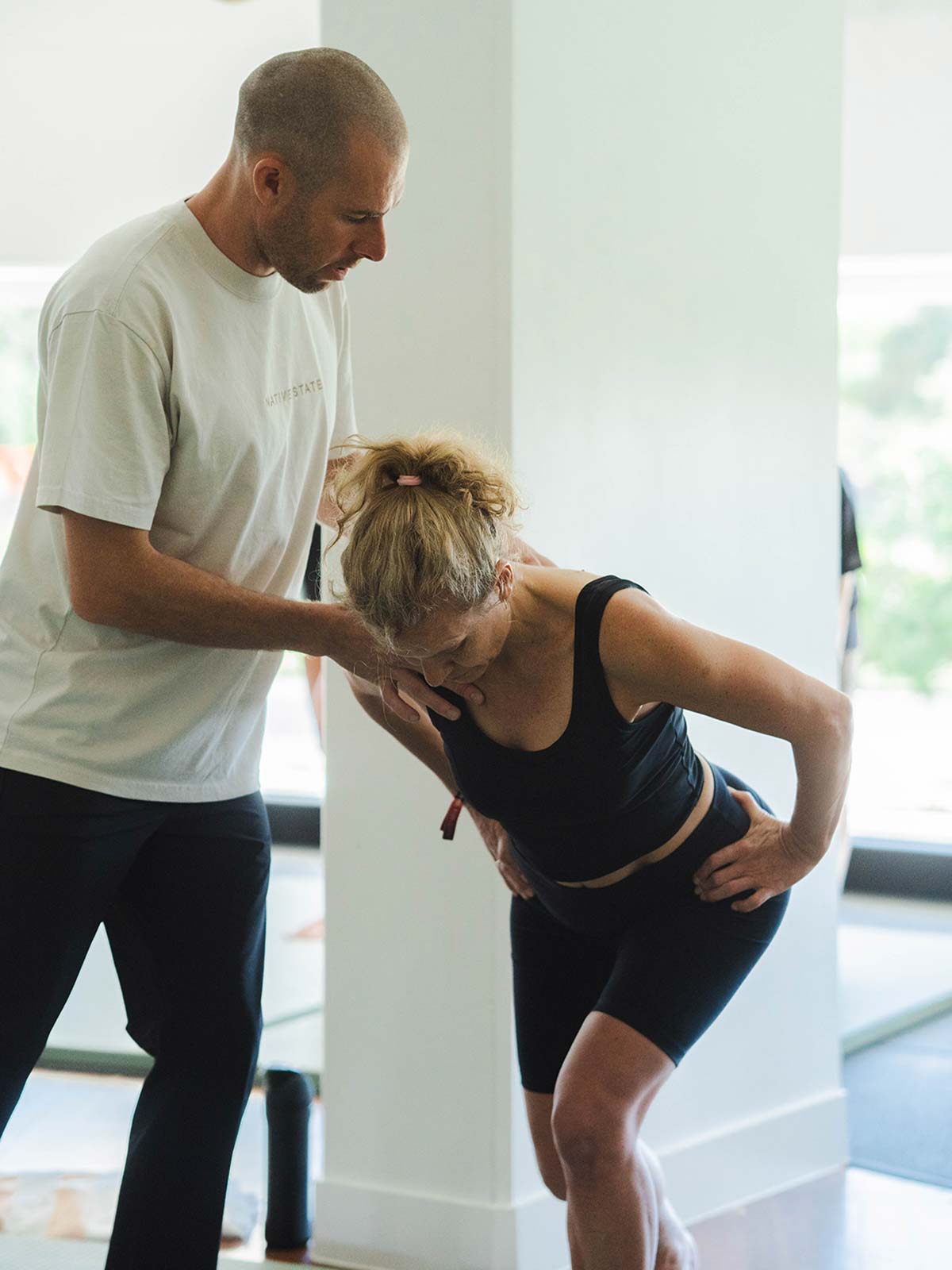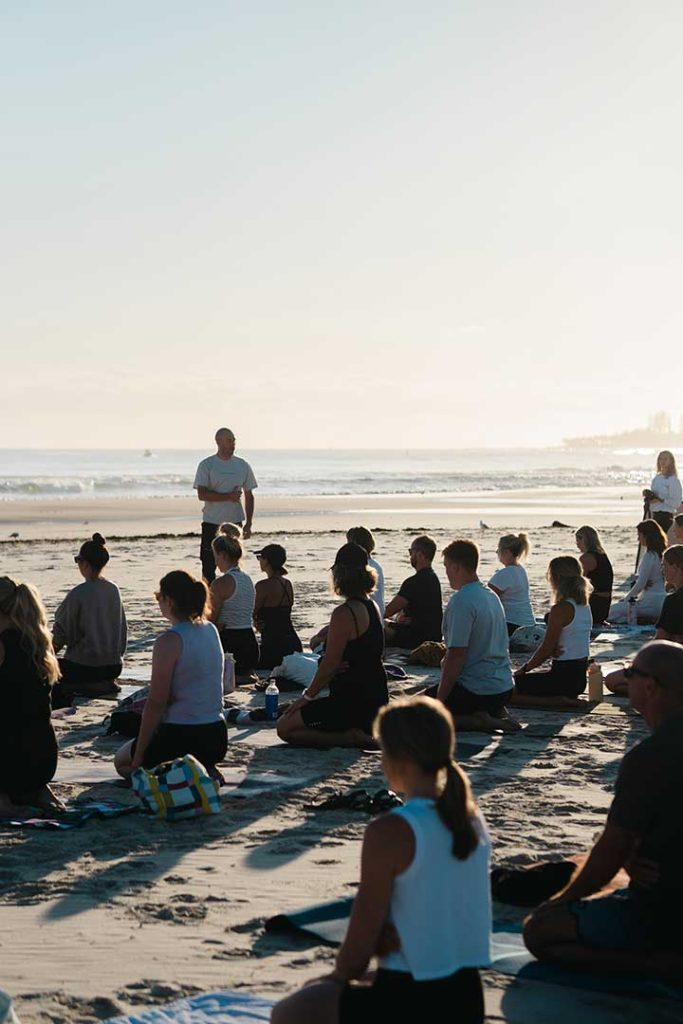Key Takeaways:
- Recovery after birth isn’t linear – it’s a layered, ongoing process that involves physical healing, emotional shifts, and nervous system support.
- Fatigue, identity changes, pelvic floor issues, and emotional overwhelm are all valid parts of the postpartum experience – and none of them mean you’re doing it wrong.
- Breathwork helps reset core function and soothe stress by reconnecting you with a slower, more grounded rhythm.
- Gentle movement supports healing best when it feels nourishing, not forced – think small, consistent actions that restore energy and presence.
- Creating simple daily rhythms can help anchor your days, especially when time feels blurry or unstructured.
- Connection – even in small moments – is one of the most powerful tools for emotional regulation and resilience in early motherhood.
You’ve just done something extraordinary – but it’s not uncommon for people to misunderstand the full spectrum of what comes next. From the outside, new motherhood is often wrapped in smiles and softness – fuzzy blankets, tiny clothes, visitors bearing gifts. But inside, it can feel raw, disorienting, and deeply overwhelming.
Between the exhaustion, body changes, and emotional waves, it’s easy to feel like you should be doing more – getting stronger, being happier, bouncing back. But what if the most powerful thing you could do was pause and reset?
That’s where the right postpartum recovery tips can make all the difference – simple things that bring you back to yourself, slowly and gently.
Postpartum recovery isn’t about going back. It’s about beginning again; slowly, gently, and on your terms. Understanding what’s shifting, both physically and emotionally, can help you move through it with more clarity and less pressure.
You’re Not Alone – The Most Common Postpartum Challenges, And Why They’re Completely Valid
Physically, Everything Feels Different
For many new mums, it’s not about wanting to look the same – it’s about feeling at home in your body again. After birth, things often feel unfamiliar. No matter how you delivered your baby, your body has done something immense. And while everyone else is meeting the baby, you’re left trying to reconnect with a version of yourself that feels changed.
You might feel weaker. Everyday movement can feel harder than expected. And with less time, less sleep, and more physical demands, it’s no wonder energy is low. That doesn’t mean you’re behind – it just means your body is still healing.
Pelvic floor issues, abdominal separation, scar sensitivity, aches from feeding or carrying – these are real, valid layers of recovery. You can’t always see them, but they affect everything. And they deserve patience.
Emotionally, There’s So Much To Process
Postpartum emotions are complex. One minute you might feel completely in love, the next completely alone. There’s the constant giving, the background hum of worry, and the quiet grief for the version of yourself who had more time, more space, more freedom. It can all feel like too much and not enough, all at once.
This isn’t just tiredness. It’s the emotional weight of being needed around the clock, while also adjusting to an entirely new identity. And layered beneath it is a pressure – often unspoken – to feel grateful, to look like you’ve got it together, to somehow bounce back.
But recovery doesn’t run on a schedule. The idea that you should be “back to normal” by three or six months only adds strain. What matters most is being honest about how you feel and giving yourself permission to move through it without judgement.
Whether you’re feeling numb, overly sensitive, distant from your partner, or overwhelmed by the smallest tasks – it’s all valid. You’re not doing it wrong. You’re adapting to something huge, and it’s okay if that takes time.
Capacity Feels Completely Rewritten
One of the hardest parts to accept in early postpartum is how limited your capacity can feel. Energy, focus, motivation – they don’t show up like they used to. Some days, cooking a meal, replying to a message, or stepping outside might feel entirely out of reach.
Movement matters, but so does recognising what’s realistic. In those early weeks, even going for a walk can feel like too much. That doesn’t mean you’re not coping – it means your system is still finding its feet.
With broken sleep, constant stimulation, and an always-on level of alertness, your nervous system is working overtime. What counts as “productive” has to shift. Some days, holding your baby and getting through the day is more than enough.
The rhythm you’re in now might not look like anyone else’s – and that’s okay. Recognising what’s changed is the first step – and the right postpartum recovery tips can help you move forward with less pressure and more presence.
Postpartum Recovery Tips: Small Practices That Make a Big Difference
Recovery doesn’t have to mean big changes or bold moves. Often, the most effective postpartum recovery tips begin by understanding what’s going on beneath the surface – physically, mentally, emotionally.
What matters is finding small, manageable ways to support yourself, one step at a time.
Tip 1: Start With The Breath – It’s Your Bridge Back To Yourself
It’s easy to overlook your breath – but during pregnancy, it changes more than you might realise. As your baby grows, your diaphragm (the muscle just below your ribs that powers your breath) gets compressed. By the third trimester, most mums are breathing up in their chest without even noticing. And after birth, that pattern often sticks around.
Shallow, chest-based breathing can keep your body in a subtle state of tension. Reconnecting with your breath helps dial that down. It also gently reactivates your deep core – including the muscles that support your spine and pelvic floor.
Try this simple reset: Place your fingertips just below your belly button, inside your hip bones. As you breathe in, see if you can direct the breath downwards, into your hands. Let your belly rise before your chest. It might feel strange at first, but two minutes of practice, a few times a day, is enough to begin shifting the pattern.
Breathwork is one of the most overlooked postpartum recovery tips, and yet it can shift your whole system from tension to calm in just a few minutes. This kind of breath work isn’t just physical – it brings a sense of calm you can actually feel. A small moment of stillness, where your body gets to exhale.
Tip 2: Honour The Nervous System – It’s The Real Engine Of Recovery
When we think of recovery, it’s easy to focus on muscles, movement, or getting stronger. But the real foundation is your nervous system. If it’s overwhelmed or under-supported, everything feels harder – thinking clearly, sleeping well, even digesting food. When it’s regulated, your body can actually start to repair and rebuild.
That’s why rest isn’t just nice to have – it’s essential. And it might not look like long naps or spa days. Sometimes it’s lying down for five minutes with your eyes closed. Sometimes it’s letting the dishes wait or saying no to visitors. A messy house, unwashed hair, unfinished tasks – none of these mean you’re failing. They just mean you’re in the thick of something real.
It can help to notice what you’re relying on to feel ‘in control.’ If you’re relying on an organised home to feel calm, what you really need is to feel calm internally. Regulate your breath, and you start to regulate your world.
Tip 3: Let Movement Be Supportive, Not a Standard to Meet
In the early months of postpartum, movement can feel like a loaded word. You might wonder if you should be doing more – or feel guilty for not doing anything at all. But the truth is, movement doesn’t need to look like exercise. It just needs to support you.
A slow walk with the pram, gentle stretching on the floor, or standing barefoot outside for a few minutes can all help you feel more connected to your body. These simple moments bring you back into yourself, especially on days when everything feels scattered. They ground your energy, wake up your circulation, and remind your nervous system that you’re safe to soften.
There’s no timeline or “right” amount. Forget the pressure to be doing workouts by a certain week. Whether it’s week six or month six, what matters is that movement feels nourishing, not punishing. Let it be something that brings you presence – not something you have to tick off a list.
Start small. One stretch. One short walk. One song to sway to while holding your baby. When movement becomes something you want to do, rather than something you feel you should do, it starts working with you – not against you.
Tip 4: Anchor Yourself With Simple Rhythms
Without the usual markers, everything can feel a bit untethered.
That’s where small, repeatable rhythms can help. Not rigid routines or strict schedules – just gentle reference points that offer a sense of steadiness. It might be stepping outside after the first feed of the day, drinking your morning coffee from the same mug, or standing barefoot on the grass for a minute while holding your baby. These moments don’t need to be special – they just need to feel doable.
Over time, they create shape around your day. They help your body clock reset, your energy shift, and your sense of self gently return. They don’t fix the blur, but they do give it some definition- and sometimes, that’s enough.
Tip 5: Connection Is a Healing Force
Postpartum can feel isolating, even when you’re never alone. The hours are full, but they can feel strangely hollow. Some days, what you need most is to feel seen – not by everyone, just by someone.
Reaching out doesn’t need to mean organising a coffee date or joining a group. It might be a quick voice note to a fellow mum, a text to someone who gets it, or simply knowing there’s a space you can show up without having to explain yourself. Whether it’s one-to-one or part of a small circle, connection brings perspective, reassurance, and a sense that you’re not doing this in isolation.
You don’t need to have it together to be in community. You just need a space where you’re allowed to be exactly as you are. And when you find it, it can change everything.
Your Postpartum Recovery Tips, In A Nutshell
Here’s a simple summary of postpartum recovery tips that can gently guide you through the fog and help you feel more like yourself again.
- Breathing Reset: Practise deep belly breathing for two minutes, three times a day. Place your hands just below your belly button and breathe into them. This helps calm your nervous system and kickstarts core recovery.
- Outside Time: Step outside each day, even for five minutes. Stand barefoot on grass or just feel the sun on your skin. Natural light helps reset your sleep rhythm and lifts your mood.
- Post-Feed Movement: If energy allows, go for a short walk after the first morning feed – even just around the block. It supports circulation, clears your head, and gives the day a gentle start.
- Daily Pause: Ask for 30 minutes of uninterrupted time each day. A solo bath, a quiet cuppa, or sitting outside with no one needing you – it’s not indulgent, it’s essential.
- Find Your People: Reach out to one other mum – someone in the same stage or a little further along. A quick check-in, a shared laugh, or a moment of honesty can shift your whole day.
Safety And Aftercare – Go Gently, Always
The practices shared here – breathwork, gentle movement, grounding rhythms – are designed to be safe and supportive for most new mums. But if you’re returning to more structured exercise, or dealing with specific concerns like pelvic floor dysfunction, abdominal separation, or birth-related trauma, it’s wise to check in with a healthcare provider first.
Pay attention to how your body responds. If you feel pain, dizziness, or emotional overwhelm, pause and seek support. These are signs to slow down, not push through.
Remember: Recovery should never feel forced. It should feel steady, nourishing, and responsive to where you are right now.
Conclusion: Recovery Is A Reconnection
Postpartum recovery is not a race to bounce back – it’s a gradual process of rebuilding, adjusting, and reconnecting. You’ve been through a major physical and emotional shift, and your body and mind need time to catch up.
The practices shared here – breathwork, rest, simple movement, nervous system care, and connection – are small steps that can make a big difference. There’s no perfect timeline, and no gold standard to measure yourself against. What matters is finding what feels supportive for you, in the life you have now.
Some days you’ll have more energy. Other days you’ll need more stillness. Both are part of healing. The more you listen to your body, honour your capacity, and give yourself permission to go gently, the more grounded and confident you’ll begin to feel.
The most powerful postpartum recovery tips aren’t about doing more – they’re about doing what actually supports your energy, your body, and your nervous system.
Remember: recovery doesn’t mean going back to who you were – it means growing into this new chapter with steadiness, care, and self-trust.
Ready To Feel Supported In Your Recovery?
You weren’t meant to do this alone. In a season where everything feels new, unpredictable, and sometimes overwhelming, having someone to walk beside you can make all the difference.
Private Coaching at Native State offers more than just a plan – it offers presence. Your coach is there to hold space, help you understand what’s happening in your body, and gently guide you back to balance. Whether it’s reconnecting with your breath, rebuilding physical strength, or finding small rhythms that actually work in your current reality, you’ll feel seen, supported, and steadily more resourced.
This is recovery that meets you exactly where you are – not where you think you should be.
Book a private coaching session here and begin your recovery with care.



